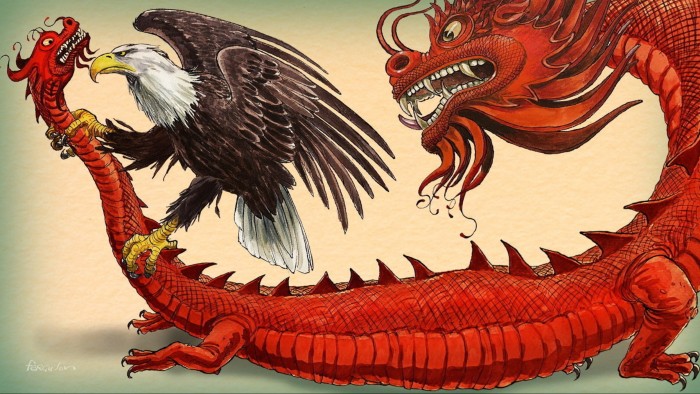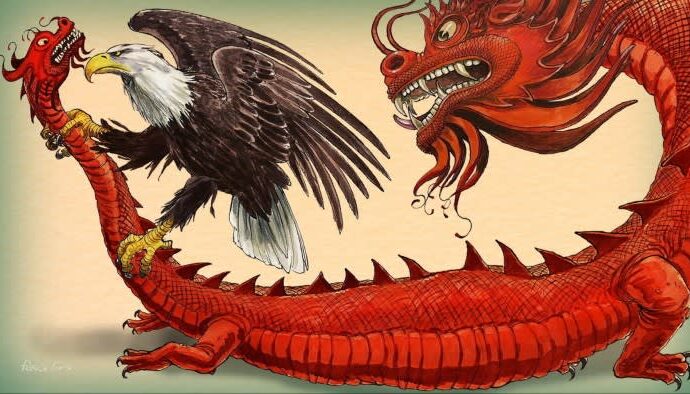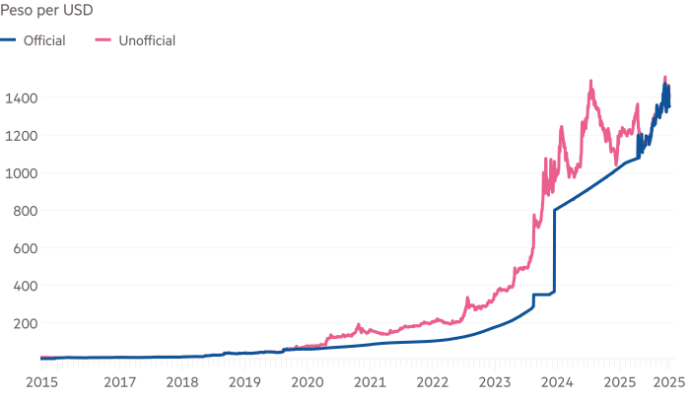
Unlock the Editor’s Digest for free
Roula Khalaf, Editor of the FT, selects her favourite stories in this weekly newsletter.
Like boxers before a championship bout, America and China are trash talking each other.
Last week, Scott Bessent, the US Treasury secretary, said that when it comes to the great punch-up over trade: “This is China versus the world.” If Beijing does not retract its threat to restrict the export of rare earth minerals, according to Bessent, the world will have to decouple from China.
For its part, Beijing called the Trump administration’s threat to impose 100 per cent tariffs on China, “a typical example of US double standards.” At an earlier stage in the tariff conflict, the Chinese foreign ministry put out a video of Mao Zedong during the Korean war, proclaiming: “No matter how long this war will last. We will never yield.”
But while the two sides posture like boxers at the weigh-in, they are also preparing to talk. Bessent plans to meet Chinese counterparts this week. There are clear signs that President Trump is looking for a deal. He has called 100 per cent tariffs unsustainable and announced that he still admires the “highly respected” President Xi.
America’s eagerness for a deal probably reflects a dawning realisation that — if the two sides really begin to trade blows — it is China that has the greater chance of putting its opponent on the canvas.
When Trump began his trade war, his starting assumption was that because America buys a lot more from China than the other way around — it was the US that had all the leverage.
That might have been true, if the US could easily replace all the goods that it buys from China. But, for certain key commodities, China is far and away the dominant supplier.
The most obvious category is the rare earths and critical minerals whose export China is now threatening to severely restrict. Anyone who follows the trade tussle between Washington and Beijing could see that punch coming from a mile off. Last August, I wrote a column headlined, “China has laid a rare earths trap for the west”. Now that trap has been sprung.
The US knows that if these new restrictions come into force in December, as China is threatening, it will not be long before some American production lines grind to a halt.
To hit America, China would have to restrict exports to the whole world — otherwise the US might be able to buy what it needs through third parties. But Bessent’s prediction that the rest of the world will then rally to America’s support is questionable — given that the US has lost so much good will by imposing tariffs on friend and foe alike. Trump’s trade policies are so widely disliked, there will be some countries that are quietly cheering on China.
Rare earths currently look like China’s most potent weapon. But there are others that could be deployed if the trade war escalates further. A new analysis published last week showed that China is the sole supplier of key chemicals in widely used pharmaceutical products — including antibiotics and treatments for heart problems, cancer and allergies. The study found that, all told, nearly 700 drugs used in the US depend on ingredients that are solely produced in China.
As geopolitical and trade tensions have mounted between the US and China, both countries have searched for pressure points that they can use. But the American search has, so far, been less successful.
When the US targeted Huawei with sanctions and banned US companies from selling it computer chips, some foresaw a painful decline and death for a leading Chinese tech company. But Huawei managed to bounce back with Chinese-made chips and tech and now seems to be going from strength to strength.
The US has also sought to ensure that America remains ahead in the race to develop AI. But export restrictions failed to prevent the emergence of DeepSeek, a highly capable Chinese alternative to American champions such as OpenAI.
If the US does respond to this alignment of forces by winding down its trade pressure on China, the lessons will extend well beyond trade wars. Both countries will know that — if it ever came to a shooting war over Taiwan — China will be able to apply real pressure to the US economy quite quickly. Given the importance of rare earths to crucial military systems, including the F35 fighter plane, the effects on any war could be quite direct.
But China would not escape from an extended trade war unscathed. It is true that the US now only accounts for about 10 per cent of Chinese exports. But with the country’s industrial economy struggling with significant over capacity and depressed domestic demand, many Chinese companies need to export to survive and can ill-afford any lost market share.
Even under current circumstances, there are not enough good jobs for the university graduates that China is churning out. Repeated purges of senior officials and military leaders also undermine the image of serene confidence at the top, that the Communist party strives to convey.
So even a “victorious” trade war would damage China. The US and China are the two heavyweights of the world economy. When two boxers face each other in the ring, one of them is usually declared the winner on the day. But, all too often, both fighters suffer long-term damage.


